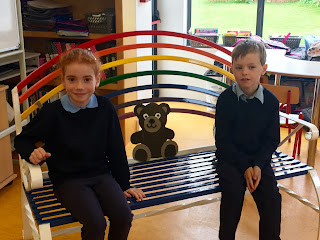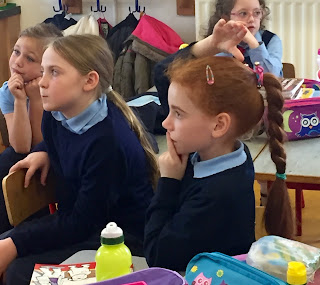
Friendship & Empathy being key
Schools are where children and young people spend most of their day. It’s where friendships happen and where relationships form. It’s where they find their self-worth – in popularity, in sports, in achievements.
And it’s where mental health issues can become obvious – and exacerbated.
Every child will invariably have to deal with stress. It’s likely they’ll also encounter social exclusion, conflicts, or bullying at some stage throughout their lives.
 |
| Little Buddies Programme |
It’s incredibly important that schools and parents are working together to prove the coping skills needed to live a hapy health life. It is vital that educating children and young people about mental health as a whole.
There’s a growing emphasis on schools providing mental health support. But in the majority of cases, this comes in the form of support only for children who directly ask for it.
Are we accepting that mental health is as important a part of life as physical health.?
PE lessons are compulsory in schools, because we view physical health as a crucial thing our children need to know about. We teach them about eating healthily, staying fit.
But are we ignoring the mental side of things – and can then lead to the extreme situation were they feel so lost and unable to get help.
Everyone has mental health. Mental health is something that everyone will have to deal with at some point in their life, whether in terms of getting help with mental well-being, helping someone else, or dealing with stressful moments and challenges.
Schools need to be portraying mental health as equally important and crucial as physical health (because it is) – and that starts with making mental health education a compulsory part of education across all schools.
Temple Street Children’s University Hospital's Report
The finding is based on an analysis of the initial assessment forms of 111 children attending the family-based W82GO service at Temple Street Children’s University Hospital in Dublin.
It found that 12% of the children who were bullied were missing days from school. Almost half of those teased were teased by their peers, although a small percentage (2%) were teased by strangers.
Temple Street started its obesity service for children in 2004 and the following year set up the W82GO programme that is delivered by a multidisciplinary team that includes a paediatrician, dietitian, nurse, chartered physiotherapist, and clinical psychologist.
Dr Samantha Doyle, a paediatrician and a member of the
W82GO Healthy Lifestyles Programme team, said their analysis revealed a high proportion of emotional and behavioural problems along with bullying.
About 5% of the children were under five years of age, and the average age at initial consultation was around 10 years.
A third (33%) of the children were experiencing emotional difficulties but just under half (46%) were linked to mental health services before starting the programme.
The initial assessment also showed that 26% had behavioural difficulties, with just over half (52%) already attending a mental health service.
Almost a third (30%) of parents said their children had learning difficulties, a figure that is well above the National Council for Special Needs Education estimated prevalence rates of 23% in 2011.
It also emerged that 15% of the children needed some intervention for development delay.
While the degree of developmental delay varied, speech and autistic spectrum disorder made up a large proportion of the difficulties.
The study, published in the latest issue of the Irish Medical Journal, points out that the findings are in contrast to the data collected by The Growing Up in Ireland study, published in 2011.
It showed that most of the nine-year-old children analysed were developing without emotional problems, with 15% to 20% in difficulty.
Early Intervention being Key
Children should learn about mental health from a young age, and wellbeing should also be a fundamental priority in every aspect of the education system. Schools are critical in helping prevent mental health problems escalating, in building wellbeing and resilience and helping young people learn the skills they need to cope in today’s world.’
Lessons need to discuss mental health as something we all have to work on, teaching children relevant skills such as dealing with stress and change, understanding their own moods and thoughts, and recognising when to ask for help.
Wouldn't it be fantastic if all schools were discussing mental health, breaking down stigma and misconceptions, explaining treatment options, showing young people that there’s nothing ‘wrong’ with struggling – that they’re not weak, or stupid, or failing because they’re finding things difficult – and creating an environment where students actually feel able to not only recognise when they’re dealing with mental health issues, but to ask for help, too.
It’s not just about tackling children’s mental health issues. It’s about equipping them for adult life.
.











